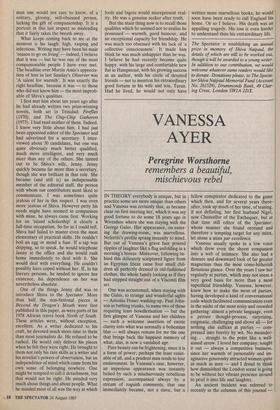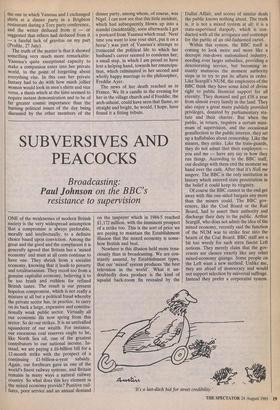VANESSA AYER
Peregrine Worsthorne remembers a beautiful, mischievous rebel
IN THEORY everybody is unique, but in practice some are more unique than others and Vanessa was certainly that, as became clear on first meeting her, which it was my good fortune to do some 18 years ago in Wivenhoe where she was staying with the George Gales. Her appearance, on enter- ing the drawing-room, was marvellous. Nefertiti's profile sprang instantly to mind. But out of Vanessa's grave face poured ripples of laughter like a flag unfolding in a morning's breeze. Moreover, following be- hind this delicately sculptured figure from an Egyptian frieze came four small chil- dren all perfectly dressed in old-fashioned clothes, the whole family looking as if they had stepped straight out of a Visconti film set.
One was accustomed, when staying with the Gales, to strange and wonderful sights — Antonia Fraser washing-up, Paul John- son in bathing trunks, to name two of those requiring least bowdlerisation — but the first glimpse of Vanessa and her children — such a welcome insertion of exotic clarity into what was normally a bohemian blur — will always remain for me the one that brings back the happiest memory of what, alas, is now a vanished age.
Pure beauty can be frightening, since it is a form of power; perhaps the least resist- able of all, and a prudent man tends to fear enslavement. In Vanessa's case, however, an imperious appearance was instantly belied by such a mischievously rebellious expression, accompanied always by a stream of roguish comments, that one immediately became, not a slave, but a
fellow conspirator dedicated to the game which then, and for several years there- after, took up much of her time, of teasing, if not deflating, her first husband Nigel, now Chancellor of the Exchequer, but at that time still editor of the Spectator, whose manner she found orotund and therefore a tempting target for any minx, let alone a minx par excellence.
Vanessa usually spoke in a low voice which drew even the shyest companion into a web of intimacy. She also had a demure and downward look of far greater magnetism than the most come-hitherish flirtatious glance. Over the years I saw her regularly at parties, which may not seem a very good basis for more than a most superficial friendship. Vanessa, however, knew how to make the most of parties, having developed a kind of conversational code which facilitated communication even in the midst of the most noisy and crowded gathering: almost a private language, even a private thought-process, surprising, enigmatic, challenging and above all — for nothing else suffices at parties — com- pressed into brevity by wit. No meander- ing. . . straight to the point like a well- aimed arrow. I loved her company; sought it out — always a competitive business, since her warmth of personality and im- aginative generosity attracted women quite as much as men — and I dread to think how diminished the London scene is going to be without her vibrant presence around to prod it into life and laughter.
An ancient incident was referred to recently in the columns of this journal — the one in which Vanessa and I exchanged shirts at a dinner party in a Brighton restaurant during a Tory party conference, and the writer deduced from it — or suggested that others had deduced from it — a fateful lack of gravitas on my part (Profile, 27 July).
The truth of the matter is that it showed something very much more remarkable: Vanessa's quite exceptional capacity to make a companion enter into her private world, to the point of forgetting about everything else. In this case her private fantasy had to do with how much jollier women would look in men's shirts and vice versa, a thesis which at the time seemed to require instant demonstration and to be of far greater cosmic importance than the burning political issues of the day being discussed by the other members of the dinner party, among whom, of course, was Nigel. I can now see that this little incident, which had subsequently blown up into a scandal (incidentally, soon afterwards I got a postcard from Vanessa which read: 'Next time you want to lose your shirt, put it on a horse') was part of Vanessa's attempt to transcend the political life to which her husband's career seemed to condemn her; a small step, in which I am proud to have lent a helping hand, towards her emancipa- tion, which culminated in her second and wholly happy marriage to the philosopher, Freddie Ayer. The news of her death reached us in France. We lit a candle in the evening for her in the village church and if Freddie, the arch-atheist, could have seen that flame, so straight and bright, he would, I hope, have found it a fitting tribute.











































 Previous page
Previous page